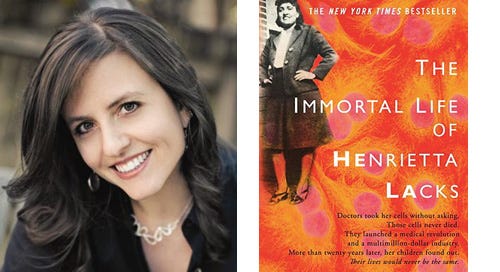As a young Black mother and tobacco farmer, Virginia native Henrietta Lacks and her husband enjoyed a good life, raising five children near Baltimore in the late 40’s. Tragically, at the prime of her life, she fell ill and was taken to Johns Hopkins Hospital after experiencing severe vaginal bleeding. She was later diagnosed with cervical cancer.
During her care, researchers took cell samples from her body without her consent and knowledge. These cells later became known as HeLa cells. In ensuing years these “immortal" cell lines (cells that divide indefinitely in a laboratory) were used for many scientific and medicinal breakthroughs involving polio, cancer, and even COVID-19 research.
Lack’s cells were mass produced, leading to untold profits for medical and scientific establishments, with no recognition to the Henrietta Lacks family. Over the years, it’s estimated that in excess 50,000,000 metric tonnes of HeLa cells have been distributed globally and used in over 100,000 studies.
Despite having received treatment from Johns Hopkins, arguably one of the finest medical institutions in the world, Lacks died on October 4, 1951 at only 31 years old.
In 2010, author Rebecca Skloot published The Immortal Life of Henrietta Lacks, a book that offered a profoundly important exegesis of Henrietta Lacks’ story, the impact Lacks had on medical science, and key bioethical issues. This in-depth examination of her life story highlights the discordant intersection between ethics, race, medicine, and scientific discovery.
The story exposes the dark history of medical experimentation on Black Americans along with efforts on the part of the Lacks family to seek redress for these wrongs. In recent years Skloot’s book has continued to grow in significance on the backdrop of Lacks’ cell lines and contribution to important research and discoveries tied to SARS-CoV-2, the precursor to Covid-19.
Skloot, who has been a tireless advocate for the family, was one of the first to expose how academic and private research labs have benefited scientifically and financially from the use and sales of
HeLa cells while providing no monetary compensation for the Lacks family. Upon Lacks’ death, the global scientific community engaged in a cover up of Lack’s race and deeper story, a historical wrong that her family is seeking to rectify.
In 2021, World Health Organization (WHO) Director-General Dr. Tedros Adhanom Ghebreyesus posthumously recognized Lacks for her scientific contribution to the world’s first line of immortal cells. According to the health organization's news release, this recognition is the first step in an effort to address the historic wrong experienced by Lacks and her family. As noted in the press release:
“In honoring Henrietta Lacks, WHO acknowledges the importance of reckoning with past scientific injustices, and advancing racial equity in health and science,” said Dr Tedros. “It’s also an opportunity to recognize women - particularly women of color - who have made incredible but often unseen contributions to medical science.”
In a ceremony held at the WHO office in Geneva Switzerland on October 13th, Lawrence Lacks, Henrietta’s 87-year-old son and one of the last known living relatives was recognized along with several of Henrietta Lacks’ grandchildren, great-grandchildren, and other family members.
Today, women of color as a result of disparities in care continue to be disproportionately impacted by a number of prevailing health conditions. By way of example, studies in the U.S. as well in a number of countries worldwide show that Black women are dying of cervical cancer at rates that far exceed those of white women.
At present, the family of Henrietta Lacks is suing biotechnology company Thermo Fisher asserting that the research company has heavily profited from her HeLa cells over the years. Providing legal representation to the Lacks family is Ben Crump, a civil rights lawyer and author of the book “Open Season: Legalized Genocide of Colored People” who gained notoriety as the legal counsel for the family of George Floyd.
“Black Books, Black Minds” is a key foundation of my Great Books, Great Minds” passion project. For me, it’s a labor of love fueled by the endless hours of work I put into researching and writing these feature articles. My aim is to ignite a new world of community, connection, and belongingness through the rich trove of Black History books, thought leaders, and authors we unearth.
So if you are enjoying this digital newsletter, find it valuable, and savor world-class book experience featuring non-fiction authors and book evangelists on Black History themes, then please consider becoming a paid member supporter at $6.00/month or $60.00/year.





